Griffith University: Neonatal Nursing Communication Presentation
VerifiedAdded on 2023/01/16
|5
|1319
|1
Presentation
AI Summary
This presentation delves into the critical importance of effective communication within the field of neonatal nursing. It highlights the multifaceted responsibilities of a neonatal nurse, including providing life-sustaining care to newborns, administering medications, monitoring vital signs, and developing treatment plans. The presentation emphasizes the significance of interpersonal and intercultural communication in building trust, fostering collaboration, and ensuring individualized care for infants. Effective communication is crucial for educating parents, addressing their concerns, and creating a supportive environment. The presentation underscores how successful communication contributes to improved patient outcomes and overall well-being of the infants. It also touches upon the nurses' specialized skills to provide education to parents and guardians. The content is valuable for students in healthcare and nursing programs, and it is available on Desklib, a platform that offers study tools and resources.
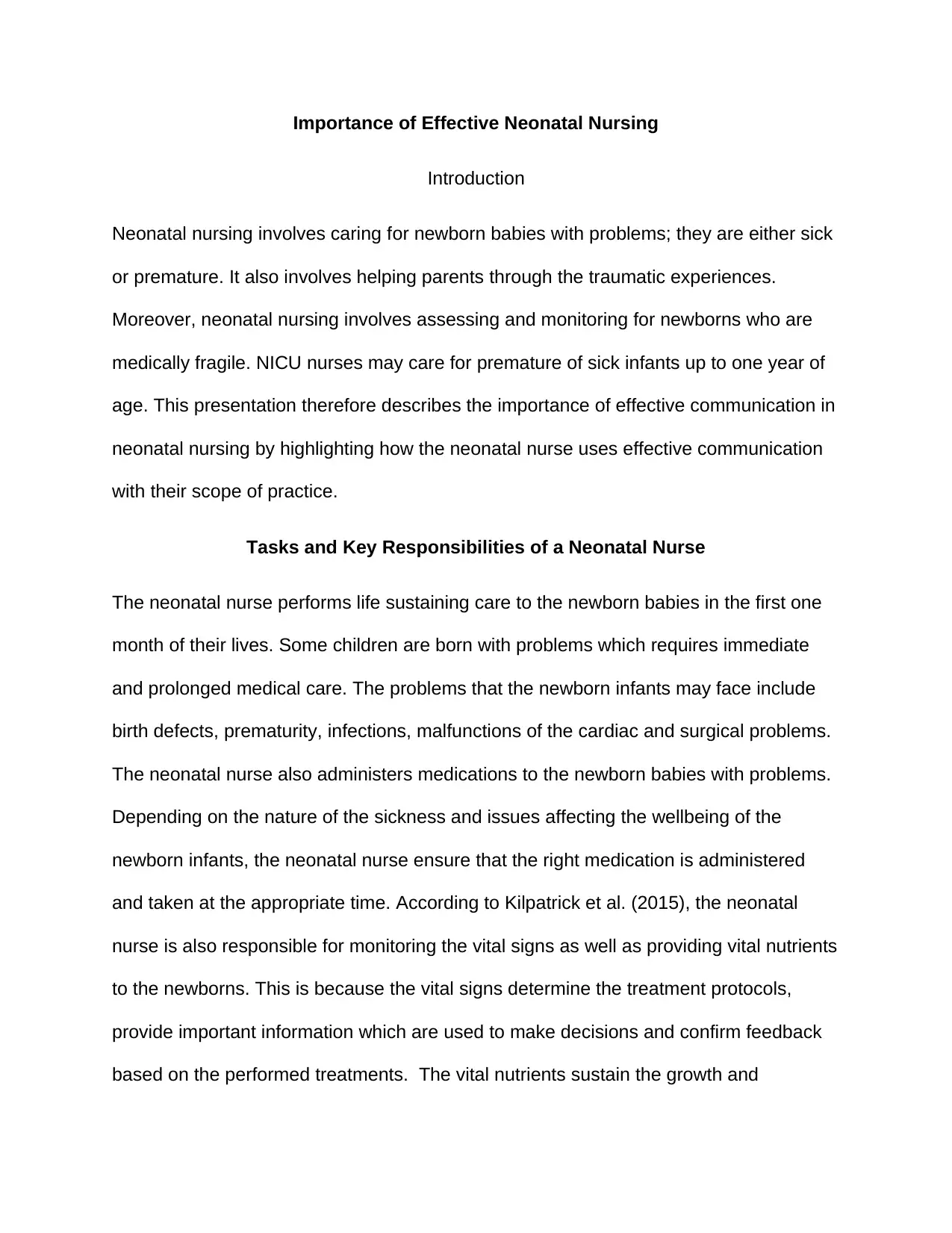
Importance of Effective Neonatal Nursing
Introduction
Neonatal nursing involves caring for newborn babies with problems; they are either sick
or premature. It also involves helping parents through the traumatic experiences.
Moreover, neonatal nursing involves assessing and monitoring for newborns who are
medically fragile. NICU nurses may care for premature of sick infants up to one year of
age. This presentation therefore describes the importance of effective communication in
neonatal nursing by highlighting how the neonatal nurse uses effective communication
with their scope of practice.
Tasks and Key Responsibilities of a Neonatal Nurse
The neonatal nurse performs life sustaining care to the newborn babies in the first one
month of their lives. Some children are born with problems which requires immediate
and prolonged medical care. The problems that the newborn infants may face include
birth defects, prematurity, infections, malfunctions of the cardiac and surgical problems.
The neonatal nurse also administers medications to the newborn babies with problems.
Depending on the nature of the sickness and issues affecting the wellbeing of the
newborn infants, the neonatal nurse ensure that the right medication is administered
and taken at the appropriate time. According to Kilpatrick et al. (2015), the neonatal
nurse is also responsible for monitoring the vital signs as well as providing vital nutrients
to the newborns. This is because the vital signs determine the treatment protocols,
provide important information which are used to make decisions and confirm feedback
based on the performed treatments. The vital nutrients sustain the growth and
Introduction
Neonatal nursing involves caring for newborn babies with problems; they are either sick
or premature. It also involves helping parents through the traumatic experiences.
Moreover, neonatal nursing involves assessing and monitoring for newborns who are
medically fragile. NICU nurses may care for premature of sick infants up to one year of
age. This presentation therefore describes the importance of effective communication in
neonatal nursing by highlighting how the neonatal nurse uses effective communication
with their scope of practice.
Tasks and Key Responsibilities of a Neonatal Nurse
The neonatal nurse performs life sustaining care to the newborn babies in the first one
month of their lives. Some children are born with problems which requires immediate
and prolonged medical care. The problems that the newborn infants may face include
birth defects, prematurity, infections, malfunctions of the cardiac and surgical problems.
The neonatal nurse also administers medications to the newborn babies with problems.
Depending on the nature of the sickness and issues affecting the wellbeing of the
newborn infants, the neonatal nurse ensure that the right medication is administered
and taken at the appropriate time. According to Kilpatrick et al. (2015), the neonatal
nurse is also responsible for monitoring the vital signs as well as providing vital nutrients
to the newborns. This is because the vital signs determine the treatment protocols,
provide important information which are used to make decisions and confirm feedback
based on the performed treatments. The vital nutrients sustain the growth and
Paraphrase This Document
Need a fresh take? Get an instant paraphrase of this document with our AI Paraphraser
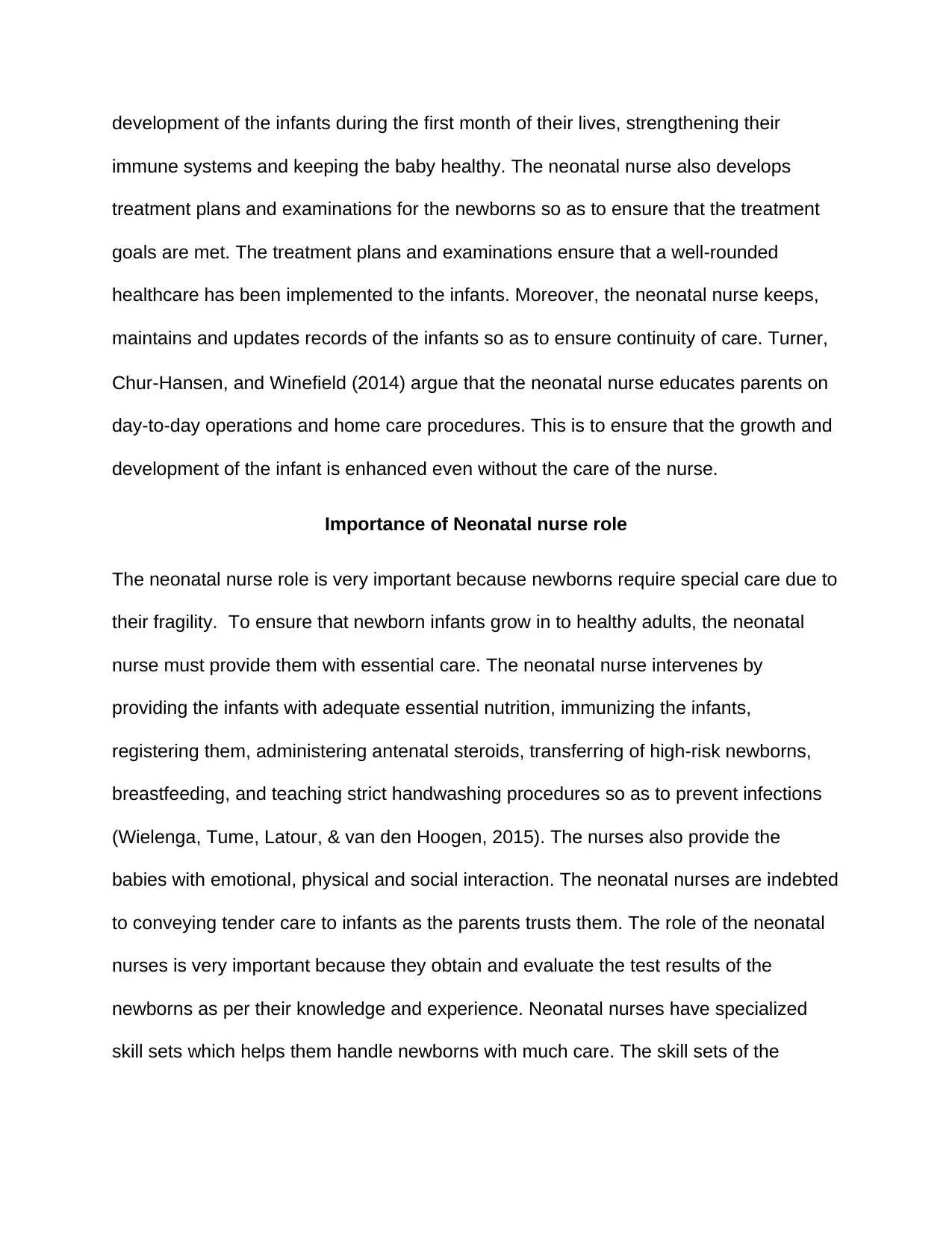
development of the infants during the first month of their lives, strengthening their
immune systems and keeping the baby healthy. The neonatal nurse also develops
treatment plans and examinations for the newborns so as to ensure that the treatment
goals are met. The treatment plans and examinations ensure that a well-rounded
healthcare has been implemented to the infants. Moreover, the neonatal nurse keeps,
maintains and updates records of the infants so as to ensure continuity of care. Turner,
Chur‐Hansen, and Winefield (2014) argue that the neonatal nurse educates parents on
day-to-day operations and home care procedures. This is to ensure that the growth and
development of the infant is enhanced even without the care of the nurse.
Importance of Neonatal nurse role
The neonatal nurse role is very important because newborns require special care due to
their fragility. To ensure that newborn infants grow in to healthy adults, the neonatal
nurse must provide them with essential care. The neonatal nurse intervenes by
providing the infants with adequate essential nutrition, immunizing the infants,
registering them, administering antenatal steroids, transferring of high-risk newborns,
breastfeeding, and teaching strict handwashing procedures so as to prevent infections
(Wielenga, Tume, Latour, & van den Hoogen, 2015). The nurses also provide the
babies with emotional, physical and social interaction. The neonatal nurses are indebted
to conveying tender care to infants as the parents trusts them. The role of the neonatal
nurses is very important because they obtain and evaluate the test results of the
newborns as per their knowledge and experience. Neonatal nurses have specialized
skill sets which helps them handle newborns with much care. The skill sets of the
immune systems and keeping the baby healthy. The neonatal nurse also develops
treatment plans and examinations for the newborns so as to ensure that the treatment
goals are met. The treatment plans and examinations ensure that a well-rounded
healthcare has been implemented to the infants. Moreover, the neonatal nurse keeps,
maintains and updates records of the infants so as to ensure continuity of care. Turner,
Chur‐Hansen, and Winefield (2014) argue that the neonatal nurse educates parents on
day-to-day operations and home care procedures. This is to ensure that the growth and
development of the infant is enhanced even without the care of the nurse.
Importance of Neonatal nurse role
The neonatal nurse role is very important because newborns require special care due to
their fragility. To ensure that newborn infants grow in to healthy adults, the neonatal
nurse must provide them with essential care. The neonatal nurse intervenes by
providing the infants with adequate essential nutrition, immunizing the infants,
registering them, administering antenatal steroids, transferring of high-risk newborns,
breastfeeding, and teaching strict handwashing procedures so as to prevent infections
(Wielenga, Tume, Latour, & van den Hoogen, 2015). The nurses also provide the
babies with emotional, physical and social interaction. The neonatal nurses are indebted
to conveying tender care to infants as the parents trusts them. The role of the neonatal
nurses is very important because they obtain and evaluate the test results of the
newborns as per their knowledge and experience. Neonatal nurses have specialized
skill sets which helps them handle newborns with much care. The skill sets of the
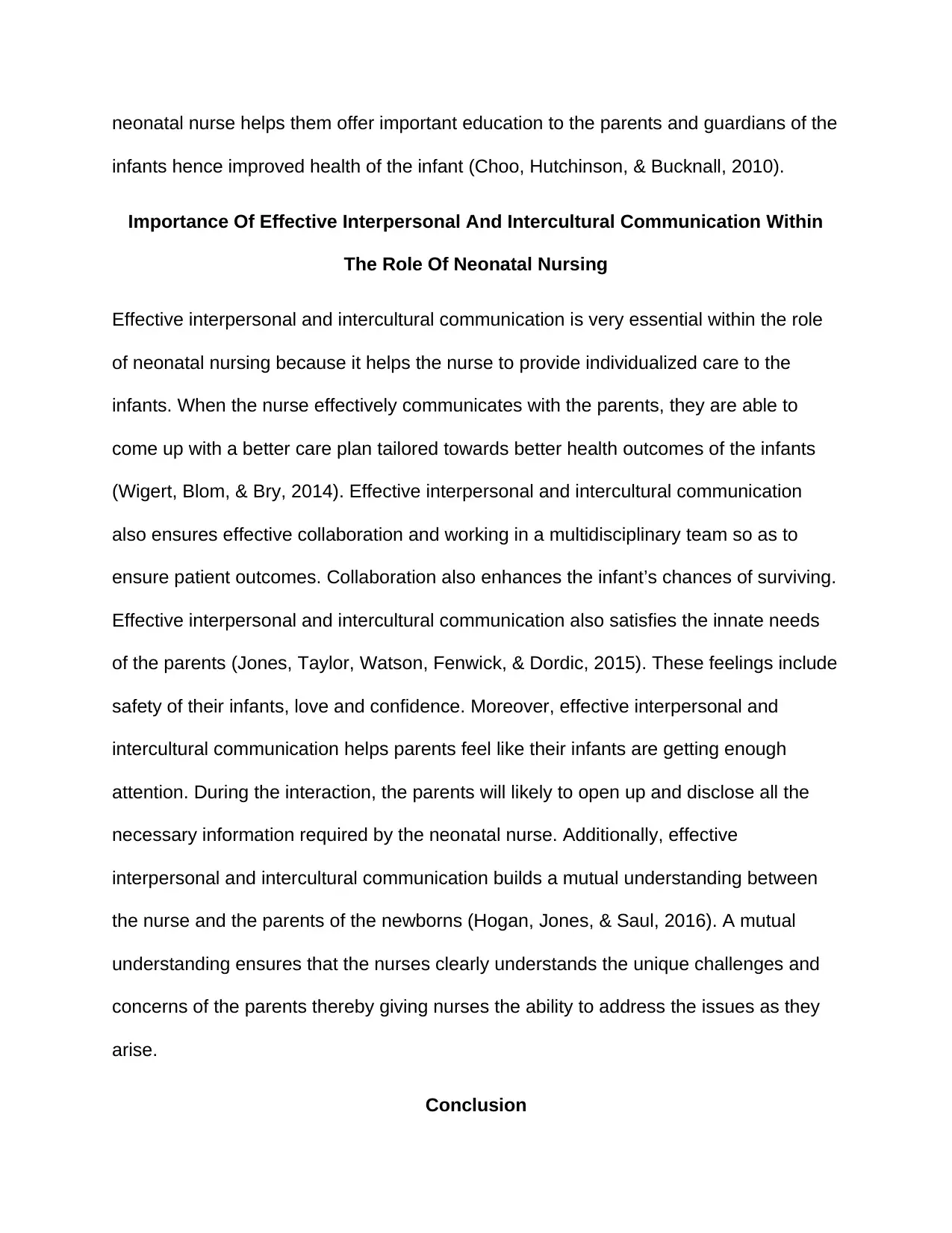
neonatal nurse helps them offer important education to the parents and guardians of the
infants hence improved health of the infant (Choo, Hutchinson, & Bucknall, 2010).
Importance Of Effective Interpersonal And Intercultural Communication Within
The Role Of Neonatal Nursing
Effective interpersonal and intercultural communication is very essential within the role
of neonatal nursing because it helps the nurse to provide individualized care to the
infants. When the nurse effectively communicates with the parents, they are able to
come up with a better care plan tailored towards better health outcomes of the infants
(Wigert, Blom, & Bry, 2014). Effective interpersonal and intercultural communication
also ensures effective collaboration and working in a multidisciplinary team so as to
ensure patient outcomes. Collaboration also enhances the infant’s chances of surviving.
Effective interpersonal and intercultural communication also satisfies the innate needs
of the parents (Jones, Taylor, Watson, Fenwick, & Dordic, 2015). These feelings include
safety of their infants, love and confidence. Moreover, effective interpersonal and
intercultural communication helps parents feel like their infants are getting enough
attention. During the interaction, the parents will likely to open up and disclose all the
necessary information required by the neonatal nurse. Additionally, effective
interpersonal and intercultural communication builds a mutual understanding between
the nurse and the parents of the newborns (Hogan, Jones, & Saul, 2016). A mutual
understanding ensures that the nurses clearly understands the unique challenges and
concerns of the parents thereby giving nurses the ability to address the issues as they
arise.
Conclusion
infants hence improved health of the infant (Choo, Hutchinson, & Bucknall, 2010).
Importance Of Effective Interpersonal And Intercultural Communication Within
The Role Of Neonatal Nursing
Effective interpersonal and intercultural communication is very essential within the role
of neonatal nursing because it helps the nurse to provide individualized care to the
infants. When the nurse effectively communicates with the parents, they are able to
come up with a better care plan tailored towards better health outcomes of the infants
(Wigert, Blom, & Bry, 2014). Effective interpersonal and intercultural communication
also ensures effective collaboration and working in a multidisciplinary team so as to
ensure patient outcomes. Collaboration also enhances the infant’s chances of surviving.
Effective interpersonal and intercultural communication also satisfies the innate needs
of the parents (Jones, Taylor, Watson, Fenwick, & Dordic, 2015). These feelings include
safety of their infants, love and confidence. Moreover, effective interpersonal and
intercultural communication helps parents feel like their infants are getting enough
attention. During the interaction, the parents will likely to open up and disclose all the
necessary information required by the neonatal nurse. Additionally, effective
interpersonal and intercultural communication builds a mutual understanding between
the nurse and the parents of the newborns (Hogan, Jones, & Saul, 2016). A mutual
understanding ensures that the nurses clearly understands the unique challenges and
concerns of the parents thereby giving nurses the ability to address the issues as they
arise.
Conclusion
⊘ This is a preview!⊘
Do you want full access?
Subscribe today to unlock all pages.

Trusted by 1+ million students worldwide
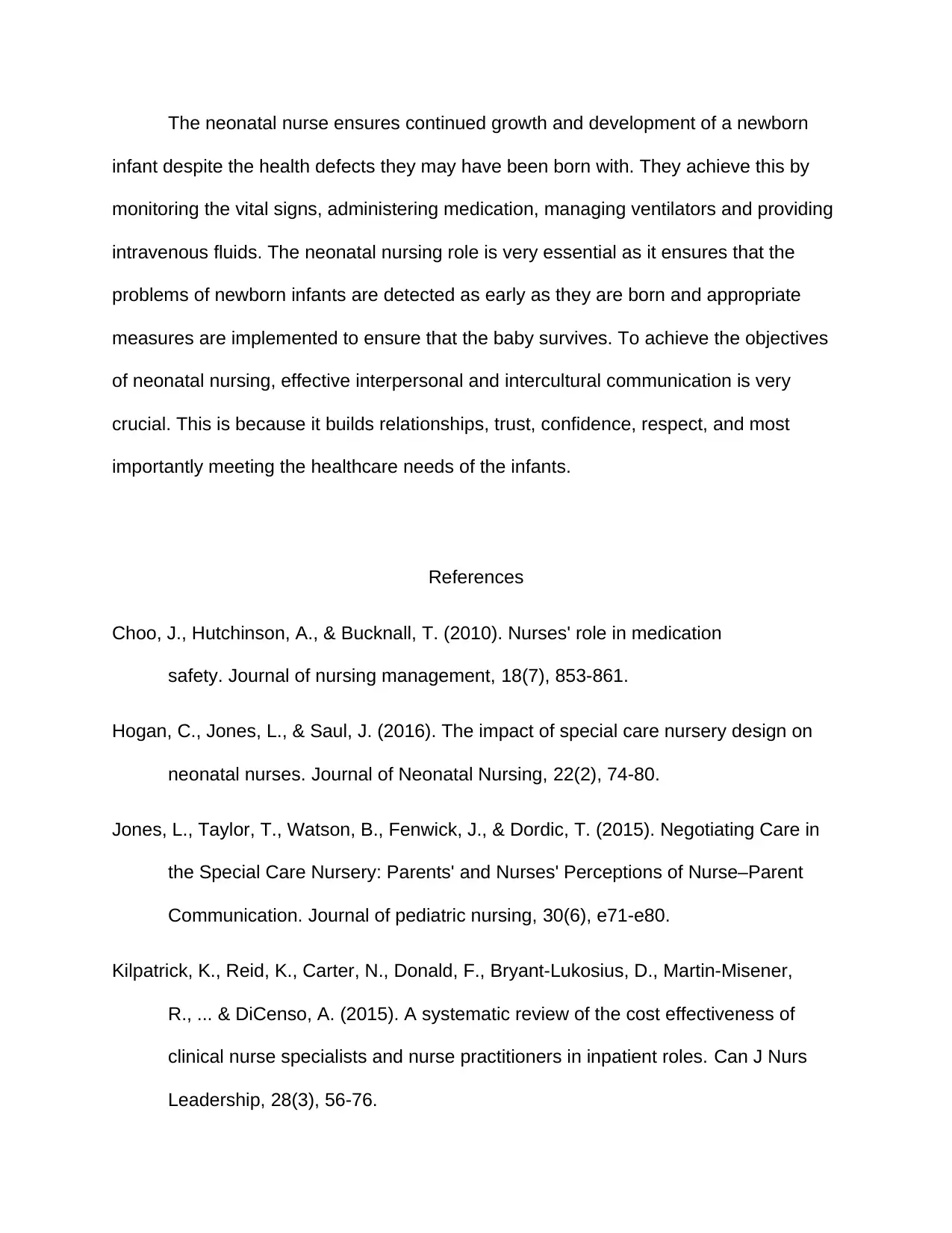
The neonatal nurse ensures continued growth and development of a newborn
infant despite the health defects they may have been born with. They achieve this by
monitoring the vital signs, administering medication, managing ventilators and providing
intravenous fluids. The neonatal nursing role is very essential as it ensures that the
problems of newborn infants are detected as early as they are born and appropriate
measures are implemented to ensure that the baby survives. To achieve the objectives
of neonatal nursing, effective interpersonal and intercultural communication is very
crucial. This is because it builds relationships, trust, confidence, respect, and most
importantly meeting the healthcare needs of the infants.
References
Choo, J., Hutchinson, A., & Bucknall, T. (2010). Nurses' role in medication
safety. Journal of nursing management, 18(7), 853-861.
Hogan, C., Jones, L., & Saul, J. (2016). The impact of special care nursery design on
neonatal nurses. Journal of Neonatal Nursing, 22(2), 74-80.
Jones, L., Taylor, T., Watson, B., Fenwick, J., & Dordic, T. (2015). Negotiating Care in
the Special Care Nursery: Parents' and Nurses' Perceptions of Nurse–Parent
Communication. Journal of pediatric nursing, 30(6), e71-e80.
Kilpatrick, K., Reid, K., Carter, N., Donald, F., Bryant-Lukosius, D., Martin-Misener,
R., ... & DiCenso, A. (2015). A systematic review of the cost effectiveness of
clinical nurse specialists and nurse practitioners in inpatient roles. Can J Nurs
Leadership, 28(3), 56-76.
infant despite the health defects they may have been born with. They achieve this by
monitoring the vital signs, administering medication, managing ventilators and providing
intravenous fluids. The neonatal nursing role is very essential as it ensures that the
problems of newborn infants are detected as early as they are born and appropriate
measures are implemented to ensure that the baby survives. To achieve the objectives
of neonatal nursing, effective interpersonal and intercultural communication is very
crucial. This is because it builds relationships, trust, confidence, respect, and most
importantly meeting the healthcare needs of the infants.
References
Choo, J., Hutchinson, A., & Bucknall, T. (2010). Nurses' role in medication
safety. Journal of nursing management, 18(7), 853-861.
Hogan, C., Jones, L., & Saul, J. (2016). The impact of special care nursery design on
neonatal nurses. Journal of Neonatal Nursing, 22(2), 74-80.
Jones, L., Taylor, T., Watson, B., Fenwick, J., & Dordic, T. (2015). Negotiating Care in
the Special Care Nursery: Parents' and Nurses' Perceptions of Nurse–Parent
Communication. Journal of pediatric nursing, 30(6), e71-e80.
Kilpatrick, K., Reid, K., Carter, N., Donald, F., Bryant-Lukosius, D., Martin-Misener,
R., ... & DiCenso, A. (2015). A systematic review of the cost effectiveness of
clinical nurse specialists and nurse practitioners in inpatient roles. Can J Nurs
Leadership, 28(3), 56-76.
Paraphrase This Document
Need a fresh take? Get an instant paraphrase of this document with our AI Paraphraser
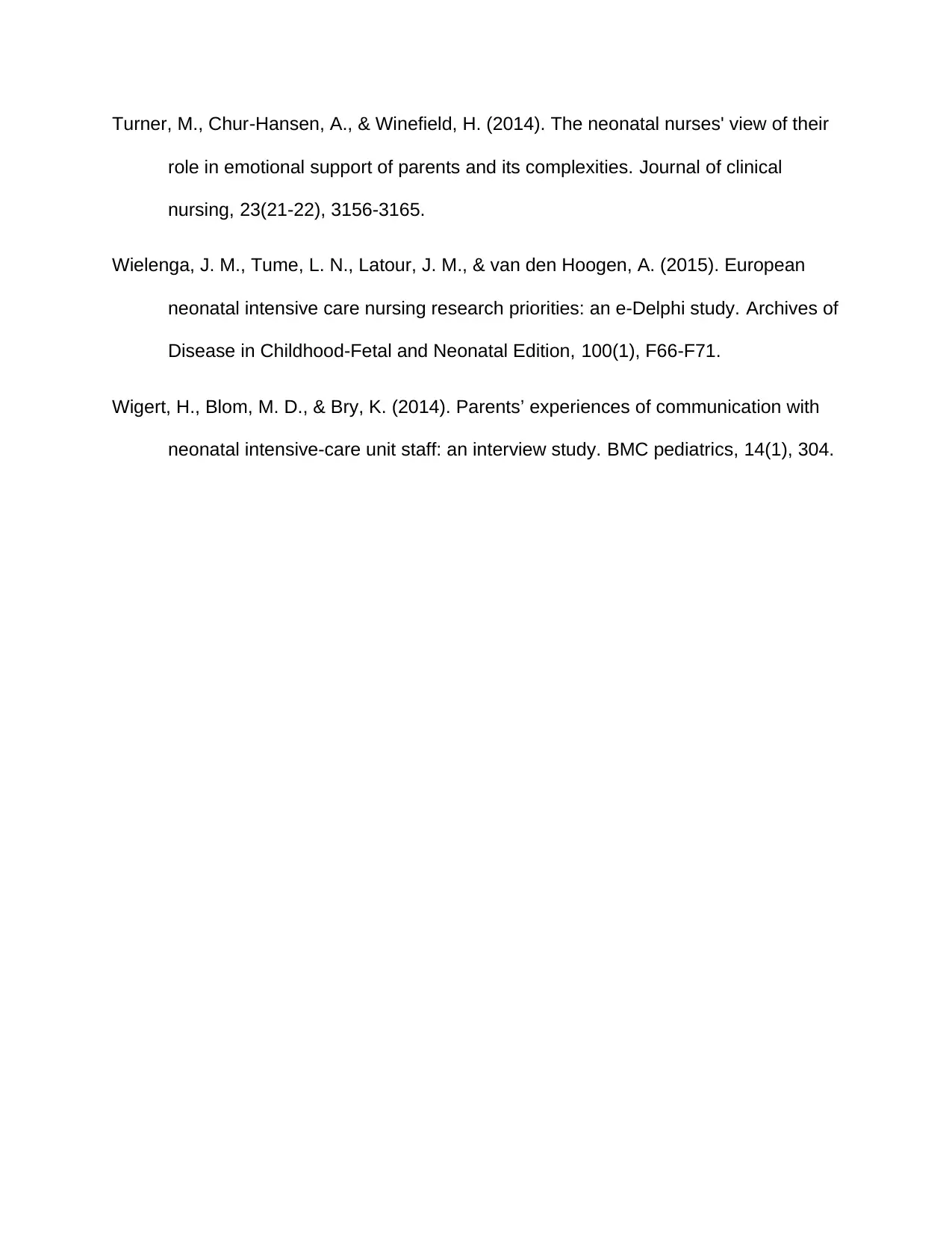
Turner, M., Chur‐Hansen, A., & Winefield, H. (2014). The neonatal nurses' view of their
role in emotional support of parents and its complexities. Journal of clinical
nursing, 23(21-22), 3156-3165.
Wielenga, J. M., Tume, L. N., Latour, J. M., & van den Hoogen, A. (2015). European
neonatal intensive care nursing research priorities: an e-Delphi study. Archives of
Disease in Childhood-Fetal and Neonatal Edition, 100(1), F66-F71.
Wigert, H., Blom, M. D., & Bry, K. (2014). Parents’ experiences of communication with
neonatal intensive-care unit staff: an interview study. BMC pediatrics, 14(1), 304.
role in emotional support of parents and its complexities. Journal of clinical
nursing, 23(21-22), 3156-3165.
Wielenga, J. M., Tume, L. N., Latour, J. M., & van den Hoogen, A. (2015). European
neonatal intensive care nursing research priorities: an e-Delphi study. Archives of
Disease in Childhood-Fetal and Neonatal Edition, 100(1), F66-F71.
Wigert, H., Blom, M. D., & Bry, K. (2014). Parents’ experiences of communication with
neonatal intensive-care unit staff: an interview study. BMC pediatrics, 14(1), 304.
1 out of 5
Related Documents
Your All-in-One AI-Powered Toolkit for Academic Success.
+13062052269
info@desklib.com
Available 24*7 on WhatsApp / Email
![[object Object]](/_next/static/media/star-bottom.7253800d.svg)
Unlock your academic potential
Copyright © 2020–2026 A2Z Services. All Rights Reserved. Developed and managed by ZUCOL.





